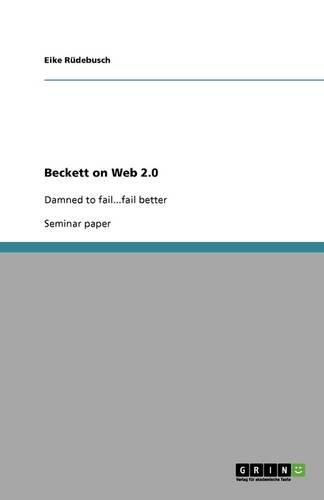Readings Newsletter
Become a Readings Member to make your shopping experience even easier.
Sign in or sign up for free!
You’re not far away from qualifying for FREE standard shipping within Australia
You’ve qualified for FREE standard shipping within Australia
The cart is loading…






Seminar paper from the year 2009 in the subject Speech Science / Linguistics, grade: 1,0, University of Siegen (Sprach-, Literatur- und Medienwissenschaften), course: Samuel Beckett - Playwright, Novelist and Writer for the TV-Screen, language: English, abstract: Samuel Beckett certainly was one of the most important artists of the 20th century. His literature and drama changed the way people perceive arts and the tragic of human existence, further the way media displays them. Although Beckett was rigid regarding the realisation of his plays he was very open towards new media and techniques. He was up to date and wrote plays for the theatre, the radio and even for television. But he died before he could have used the possibilities the internet offers nowadays. Nevertheless, Beckett is omnipresent in today s internet. You just have to type his name into Google and you will find 1.470.000 hits referring to him.1 Especially his presence on Youtube, a video community on the internet, is astonishing. There people have found many ways to adapt one or several of Beckett s works the way they wanted to. One could raise the question if this was what Beckett wanted, if this could have been avoided or if this was part of a logical consequence of the technological progress and the developments the internet has gone through within the last decade. Having Paul Virilio s media theory in mind, the Aesthetics of Disappearance, in which he argues about the speed of information and the transformation of media, there is always a next step in terms of media, which in the end has led to the internet as it is today. Beckett always took that next step himself. Therefore, Beckett being part of the internet is the logical consequence of his work, of the way he used or was intrigued by different media, of the way he brought art to the latest medium - or is it not? Throughout this paper I will argue that Beckett s work Play needed to be placed on the internet. I will try to prove that Play can
$9.00 standard shipping within Australia
FREE standard shipping within Australia for orders over $100.00
Express & International shipping calculated at checkout
Seminar paper from the year 2009 in the subject Speech Science / Linguistics, grade: 1,0, University of Siegen (Sprach-, Literatur- und Medienwissenschaften), course: Samuel Beckett - Playwright, Novelist and Writer for the TV-Screen, language: English, abstract: Samuel Beckett certainly was one of the most important artists of the 20th century. His literature and drama changed the way people perceive arts and the tragic of human existence, further the way media displays them. Although Beckett was rigid regarding the realisation of his plays he was very open towards new media and techniques. He was up to date and wrote plays for the theatre, the radio and even for television. But he died before he could have used the possibilities the internet offers nowadays. Nevertheless, Beckett is omnipresent in today s internet. You just have to type his name into Google and you will find 1.470.000 hits referring to him.1 Especially his presence on Youtube, a video community on the internet, is astonishing. There people have found many ways to adapt one or several of Beckett s works the way they wanted to. One could raise the question if this was what Beckett wanted, if this could have been avoided or if this was part of a logical consequence of the technological progress and the developments the internet has gone through within the last decade. Having Paul Virilio s media theory in mind, the Aesthetics of Disappearance, in which he argues about the speed of information and the transformation of media, there is always a next step in terms of media, which in the end has led to the internet as it is today. Beckett always took that next step himself. Therefore, Beckett being part of the internet is the logical consequence of his work, of the way he used or was intrigued by different media, of the way he brought art to the latest medium - or is it not? Throughout this paper I will argue that Beckett s work Play needed to be placed on the internet. I will try to prove that Play can